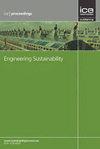Sustainable practices in construction project management: impacts on triple bottom line
IF 2.5
4区 工程技术
Q3 ENGINEERING, CIVIL
Proceedings of the Institution of Civil Engineers-Engineering Sustainability
Pub Date : 2023-07-31
DOI:10.1680/jensu.21.00109
引用次数: 0
Abstract
There are many possibilities to improve sustainable management in construction industry. In this context, this article aims to analyze the influence of construction practices, organized in factors, in sustainability dimensions. For this, a survey with 80 project managers from construction industry was performed. The participants answered about the sustainable management practices used in their projects, as well as their performance in relation to indicators in the social, economic and environmental dimensions. The data were analyzed via Confirmatory Factor Analysis and Logistic Regression. It was possible to verify that not all the analyzed factors (as well as the practices that compose them) can be considered significant to explain all the dimensions of sustainability. Another interesting finding is that the influence levels of the factors vary widely, indicating that some factors are more important than others in the pursuit of (one or more) sustainability dimensions. In addition, contrary to expectations, not all factors (and therefore not all practices) have a positive impact on the sustainability of construction projects. The Resource management and pollution factor negatively influences Economic sustainability. This study sought to contribute to broaden the understanding of the sustainable practices in construction project management and guide future analysis and research.建筑项目管理中的可持续实践:对三重底线的影响
提高建筑行业可持续管理的可能性有很多。在此背景下,本文旨在分析建筑实践的影响,组织因素,在可持续发展的维度。为此,我们对80名建筑行业的项目经理进行了调查。参与者回答了他们在项目中使用的可持续管理实践,以及他们在社会、经济和环境方面的指标方面的表现。采用验证性因子分析和Logistic回归对数据进行分析。可以证实,并非所有分析的因素(以及构成这些因素的做法)都可以被认为是解释可持续性的所有方面的重要因素。另一个有趣的发现是,这些因素的影响程度差别很大,表明在追求(一个或多个)可持续性方面,有些因素比其他因素更重要。此外,与预期相反,并不是所有的因素(因此也不是所有的实践)都对建筑项目的可持续性有积极的影响。资源管理和污染因素对经济可持续性产生负向影响。本研究旨在扩大对建筑项目管理中可持续实践的理解,并指导未来的分析和研究。
本文章由计算机程序翻译,如有差异,请以英文原文为准。
求助全文
约1分钟内获得全文
求助全文
来源期刊

Proceedings of the Institution of Civil Engineers-Engineering Sustainability
ENGINEERING, CIVIL-ENGINEERING, CIVIL
CiteScore
3.70
自引率
16.70%
发文量
44
审稿时长
>12 weeks
期刊介绍:
Engineering Sustainability provides a forum for sharing the latest thinking from research and practice, and increasingly is presenting the ''how to'' of engineering a resilient future. The journal features refereed papers and shorter articles relating to the pursuit and implementation of sustainability principles through engineering planning, design and application. The tensions between and integration of social, economic and environmental considerations within such schemes are of particular relevance. Methodologies for assessing sustainability, policy issues, education and corporate responsibility will also be included. The aims will be met primarily by providing papers and briefing notes (including case histories and best practice guidance) of use to decision-makers, practitioners, researchers and students.
 求助内容:
求助内容: 应助结果提醒方式:
应助结果提醒方式:


